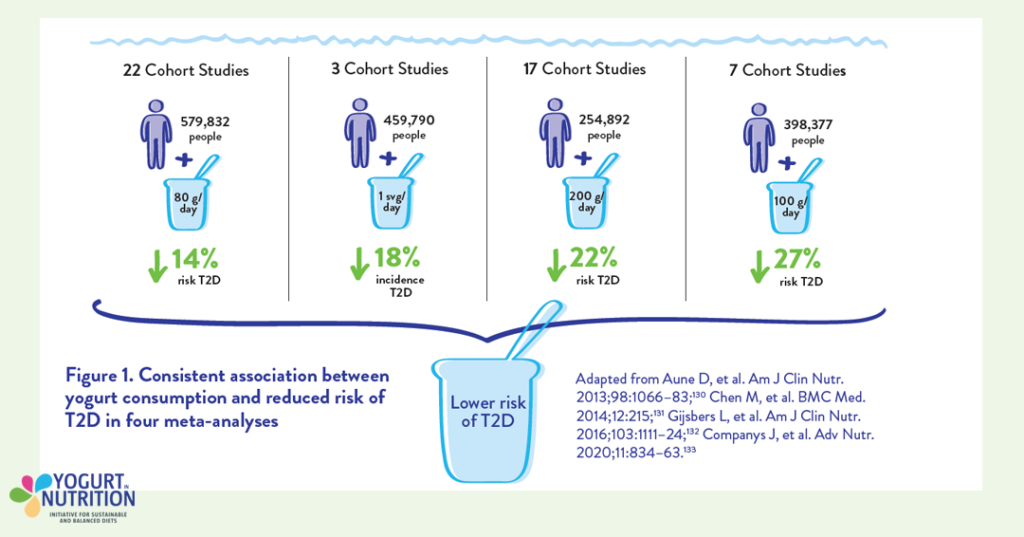In March 2024, the U.S. Food and Drug Administration (FDA) approved a qualified health claim regarding the consumption of yogurt and its association with a reduced risk of type 2 diabetes (T2D). On June 29, 2024, a conference organized as part of the Nutrition 2024 Congress in Chicago revisited this announcement. It provided an opportunity for Christopher J. Cifelli (NDC) and Wendy Reinhardt Kapsak (IFIC) to elaborate on the scientific basis of this claim and discuss its potential implications.
The health burden of Type 2 diabetes
In the United States, 38.4 million people have diabetes, which represents 11.6% of the population. Additionally, it is estimated that 97.6 million adults have pre-diabetes, putting them at greater risk of developing type 2 diabetes (T2D). Over the past 20 years, the number of adults diagnosed with diabetes has more than doubled.
However, adopting healthy lifestyle choices can help reduce the risk of T2D and lower public health costs:
- Excess body weight is a significant risk factor for T2D. Maintaining a healthy weight can reduce the risk of T2D and many other chronic diseases.
- Regular exercise helps manage blood sugar levels and lowers the risk of heart disease and other complications.
- A healthy diet forms a crucial part of the foundation for T2D prevention, treatment, and management.
Yogurt as part of a balanced diet: specific benefits for T2D
Yogurt offers specific benefits for type 2 diabetes (T2D) when included as part of a balanced diet. Four meta-analyses have consistently reported an association between yogurt consumption and a reduced risk of T2D (2-5).

The inverse association between yogurt consumption and T2D risk has been observed in populations across North America, Europe, the UK, Australia, and Japan. A meta-analysis of 14 studies, encompassing 483,090 individuals (with 32,896 T2D cases), found a 7% reduction in the risk of T2D for every 50 g (approximately 2 ounces) increase in daily yogurt consumption.
Evaluating the association between yogurt intake and diabetes-related parameters
In addition to the four meta-analyses, extensive data supports the role of yogurt in reducing the risk of type 2 diabetes (T2D). The FDA’s qualified health claim is based on robust methodology, and the association between yogurt intake and diabetes-related parameters was evaluated through a comprehensive literature search of 140 publications. Many articles were excluded for the following reasons:
- Background materials (reviews, meta-analyses, reports),
- Lack of assessment of yogurt’s effect on T2D-related parameters,
- Absence of scientific conclusions.
Ultimately, 28 observational studies, encompassing 860,000 subjects from 27 cohorts across 10 different countries, were included in the final analysis. These studies allowed for scientific conclusions to be drawn. Among these:
- 6 high-quality methodological studies on prospective cohorts in the U.S. or Spain found an inverse relationship between yogurt consumption and the risk of T2D (3,6-10).
- 3 high-quality studies examined changes in yogurt intake and reported a reduced risk of T2D (11-13).
- 12 studies of lower methodological quality showed positive but inconsistent findings or varying results.
No statistically significant association was found between yogurt intake or changes in yogurt intake and a reduced risk of type 2 diabetes among the six studies with high methodological quality.
Based on this detailed analysis, credible scientific evidence indicates a statistically significant association between yogurt consumption and a reduced risk of type 2 diabetes. This association pertains to yogurt as a whole food rather than any single nutrient or compound within yogurt, regardless of its fat or sugar content.
How might yogurt reduce T2D risk?
Several mechanisms may explain the association between yogurt consumption and a reduced risk of type 2 diabetes (T2D).
People who consume yogurt are less likely to have unhealthy lifestyles that are linked to an increased risk of T2D (15).
Yogurt is a low glycemic index food, meaning it does not cause a significant spike in blood glucose levels after a meal.
Chronic systemic inflammation may contribute to many noncommunicable diseases, including diabetes, and recent evidence suggests that regular yogurt consumption may have an anti-inflammatory effect (16,17).
Live bacteria in yogurt can improve gut microbiota composition, which may help reduce inflammation, a factor linked to T2D.
Conclusion: Substantial evidence links yogurt consumption to better health outcomes
Numerous high and moderate-quality studies have found an inverse relationship between yogurt intake and type 2 diabetes.
Yogurt is a nutrient-dense food, providing essential nutrients, and is included in all three healthy dietary patterns recommended by the Dietary Guidelines for Americans.
Yogurt has a unique food matrix that may contribute to its protective effects on cardiometabolic health, regardless of its fat content.
These study results are consistent with other research examining the broader health benefits of yogurt consumption.
Thank you for Christopher J. Cifelli, PhD, Senior Vice President of Nutrition Research National Dairy Council, for this intervention on “Exploring the Scientific Evidence: Yogurt and Reduced Risk of Type 2 Diabetes” during the ASN Nutrition 2024 conference “Yogurt and reduced risk of T2D: exploring the new FDA qualified health claim and potential implication for improving public health”.
References
- Letter of Enforcement Discretion. March 2024.
- Aune D, Norat T, Romundstad P, et al. Dairy products and the risk of type 2 diabetes: a systematic review and dose response meta-analysis of cohort studies. Am J Clin Nutr. 2013;98:1066–83.
- Chen M, Sun Q, Giovannucci E, et al. Dairy consumption and risk of type 2 diabetes: 3 cohorts of US adults and an updated meta-analysis. BMC Med. 2014;12:215.
- Gijsbers L, Ding EL, Malik VS, et al. Consumption of dairy foods and diabetes incidence: a dose-response metaanalysis of observational studies. Am J Clin Nutr. 2016;103:1111–24.
- Companys J, Pla-Pagà L, Calderón-Pérez L, et al. Fermented dairy products, probiotic supplementation, and cardiometabolic diseases: a systematic review and meta-analysis. Adv Nutr. 2020;11:834–63.
- Liu S, Choi HK, Ford E, Song Y, Klevak A, Buring JE, Manson JE. A prospective study of dairy intake and the risk of type 2 diabetes in women. Diabetes Care. 2006 Jul;29(7):1579-84.
- Choi HK, Willett WC, Stampfer MJ, Rimm E, Hu FB. Dairy consumption and risk of type 2 diabetes mellitus in men: a prospective study. Arch Intern Med. 2005 May 9;165(9):997-1003.
- Guasch-Ferré M, et al. Total and subtypes of dietary fat intake and risk of type 2 diabetes mellitus in the Prevención con Dieta Mediterránea (PREDIMED) study. Am J Clin Nutr. 2017 Mar;105(3):723-735.
- Díaz-López A, Bulló M, Martínez-González MA, et al. Dairy product consumption and risk of type 2 diabetes in an elderly Spanish Mediterranean population at high cardiovascular risk. Eur J Nutr. 2016;55:349–60.
- Babio N, B et al; PREDIMED Investigators. Consumption of Yogurt, Low-Fat Milk, and Other Low-Fat Dairy Products Is Associated with Lower Risk of Metabolic Syndrome Incidence in an Elderly Mediterranean Population. J Nutr. 2015 Oct;145(10):2308-16.
- Drouin-Chartier JP, Li Y, Ardisson Korat AV, et al. Changes in dairy product consumption and risk of type 2 diabetes: results from 3 large prospective cohorts of US men and women. Am J Clin Nutr. 2019;110:1201–12.
- Drouin-Chartier JP, Hernández-Alonso P, Guasch-Ferré M, et al. Dairy consumption, plasma metabolites, and risk of type 2 diabetes. Am J Clin Nutr. 2021;114:163–74.
- Trichia E, Luben R, Khaw KT, Wareham NJ, Imamura F, Forouhi NG. The associations of longitudinal changes in consumption of total and types of dairy products and markers of metabolic risk and adiposity: findings from the European Investigation into Cancer and Nutrition (EPIC)-Norfolk study. Am J Clin Nutr. 2020 May 1;111(5):1018-1026.
- Yuzbashian E, Asghari G, Mirmiran P, Chan CB, Azizi F. Changes in dairy product consumption and subsequent type 2 diabetes among individuals with prediabetes: Tehran Lipid and Glucose Study. Nutr J. 2021 Oct 29;20(1):88.
- Tremblay A, Panahi S. Yogurt consumption as a signature of a healthy diet and lifestyle. J Nutr. 2017;147:1476S–80S
- Torres-Gonzalez M, Rice Bradley BH. Whole-Milk Dairy Foods: Biological Mechanisms Underlying Beneficial Effects on Risk Markers for Cardiometabolic Health. Adv Nutr. 2023 Nov;14(6):1523-1537.
- Weaver CM. Dairy matrix: is the whole greater than the sum of the parts? Nutrition Reviews. 2021;79:4-15.
- Walther B, Karl JP, Booth SL, et al. Menaquinones, bacteria, and the food supply: the relevance of dairy and fermented food products to vitamin K requirements. Adv Nutr. 2013;4:463–73



